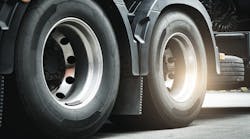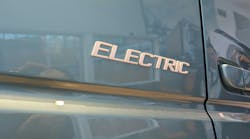I keep hearing talk about how tires on electric vehicles will wear faster than tires on diesel-powered trucks. So, I thought I should look into that bit since tires represent a huge cost to fleets. In fact, according to the American Transportation Research Institute’s An Analysis of the Operational Costs of Trucking: 2019 Update, the average marginal cost per mile of tires is $0.038 which represents 2% of a fleet’s operating cost per mile.
In the real world, extending tire life is a critical part of cost management for fleets and fleet managers have expectations about how long tires should last. If tires on electric vehicles are going to wear faster than those on diesel trucks, fleets will not be happy.
Diesel trucks, particularly when loaded, are inherently slow at accelerating from a stop light, probably to the chagrin of cars stuck behind them.
Instantaneous acceleration might be great for hot rodding, but “reasonable and prudent” acceleration is what fleets want. Although in his 2017 reveal of the prototype Tesla Semi, Elon Musk, hyped the acceleration possible for electric trucks. The use of electric motors allows for instantaneous torque. Zero to 60 mph was to become an important factor, he posited. Fleets probably groaned at his lack of understanding of tires and tire costs for trucks and even the realities of how long it takes to get a truck up to speed.
Electric trucks, both battery electric and their hybrid cousins including fuel cells and a variety of other electric hybrids, are controlled by software. This means that the acceleration can be programmed with limits and controls to a profile amenable to both the drivers and the fleet owners.
At an event in Montreal in 2019, Rick Mihelic, NACFE’s director of emerging technologies, sat through a presentation by an electric school bus maintenance manager from a Sacramento area school district who had been running electric school buses for several years. The presenter reported that his electric bus tire life had been extended significantly compared to his diesel buses. Rick talked with the presenter after his session, and they came to the conclusion that this was most likely due to software controls on the acceleration profiles programmed for the buses.
One thing we need to keep in mind when assessing any electric vehicle is that we have not yet climbed the learning curve on electric heavy-duty trucks. Meaning we don't have a great deal of experience to base our opinions on. There are going to be plenty of opportunities for innovation and fact finding to put speculation aside.
Tire life and acceleration profiles will open the door to tuning vehicle performance based on fleet needs. Think about a new driver getting one programmed “newbie” acceleration profile, while a million-mile safe experienced driver might get a more flexible acceleration.
All this is will be possible because of software. My advice is not to jump to any conclusions about electric trucks and tire life. Let’s get some on the road in real-world operation and then see how they perform and what software tweaks will be needed to get them to perform even better.
Michael Roeth has worked in the commercial vehicle industry for nearly 30 years, most recently as executive director of the North American Council for Freight Efficiency. He currently serves on the second National Academy of Sciences Committee on Technologies and Approaches for Reducing the Fuel Consumption of Medium and Heavy-Duty Vehicles and has held various positions in engineering, quality, sales and plant management with Navistar and Behr/Cummins.



